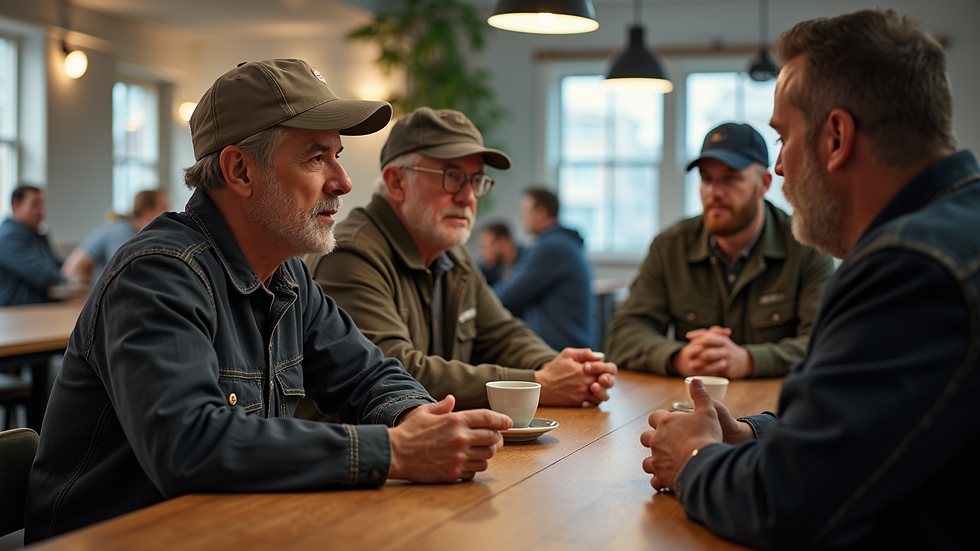How Community Programs Make a Difference for Veterans
- Fire Team

- Jun 5, 2025
- 4 min read
Updated: Jun 24, 2025
Veterans have served our country proudly, but many face challenges upon returning to civilian life. Community programs play a vital role in easing this transition. They provide support, resources, and a sense of belonging that can make a significant difference. In this post, we will explore various veteran programs and how they positively impact the lives of those who have worn the uniform.
Veteran Programs: Connecting Communities with Veterans
Veteran programs are designed to help former service members reintegrate into their communities. These initiatives focus on several areas, including mental health, employment, education, and social connectivity.
One such program is "Veterans Employment through Technical Education", which provides training in high-demand fields. Statistics show that veterans who participate in specialized job training programs are 60% more likely to secure employment compared to those who do not. This is crucial because many veterans return from service with valuable skills but often struggle to translate those into civilian jobs.

Additionally, community programs often hold job fairs specifically for veterans. These events bring together local businesses looking to hire veterans, which helps bridge the gap between military experience and civilian employment. Programs like these not only help veterans find jobs but also give them the confidence to navigate the job market effectively.
Mental Health Support: A Pillar of Community Programs
Mental health is another critical area where veteran programs make a difference. The anxiety and trauma associated with military service can lead to depression, PTSD, and other mental health issues. Community programs provide therapeutic resources, peer support groups, and counseling services to assist veterans in their healing journey.
For instance, organizations such as the Veteran's Administration and local non-profits offer group therapy sessions that allow veterans to share their experiences. Research indicates that veterans participating in support groups report a 65% increase in feelings of belonging and understanding among peers. It is vital to create spaces where veterans feel safe to express their thoughts and emotions.

Moreover, many community centers have begun integrating mindfulness and wellness programs tailored for veterans. These practices emphasize mental health and well-being, helping veterans to manage stress and improve their quality of life without needing solely clinical approaches. These programs often incorporate yoga, meditation, and even art therapy, making mental wellness accessible and engaging.
Educational Opportunities: Expanding Horizons for Veterans
Education is another foundation of community programs aimed at veterans. Many veterans choose to further their education upon returning home, and community programs are vital facilitators in this process. They help simplify the often-complex path to education through resources like counseling services and financial aid assistance.
A notable initiative is the “G.I. Bill,” which provides financial assistance for those seeking higher education. Many community organizations assist eligible veterans in navigating this process, ensuring they receive all benefits available to them. Studies have shown that veterans who pursue education can earn up to 30% more than those who don’t take advantage of these educational opportunities.

Additionally, mentoring programs connect veterans with educational advisors who can guide them through their academic journey. These mentors can provide insights into choosing the right field of study and help veterans transition their military skills into academic success.
Building Connections: The Social Impact of Community Programs
Social isolation is a common challenge for many veterans. Programs targeting this issue focus on building connections and fostering social networks among veterans and the community at large. By promoting social engagement, these programs help combat feelings of loneliness and disconnection.
Activities such as community service projects, recreational outings, and veteran-oriented social gatherings create opportunities for veterans to meet others who share similar experiences. For instance, many local organizations host monthly meet-ups, providing a relaxed atmosphere for veterans to connect over shared interests.

Statistics show that veterans who actively participate in social programs report higher satisfaction levels in life. These gatherings not only provide camaraderie but also help promote mental wellness through shared experiences. The power of community cannot be underestimated, and initiatives aiming to bring veterans together are essential.
Long-Term Benefits of Community Support for Veterans
In the long run, community programs create a profound impact on veterans’ lives, aiding in their successful reintegration into civilian life. The key is collaboration among governmental bodies, non-profits, and private organizations to ensure that veterans receive comprehensive support.
Veteran programs offer resources for economic stability, mental health support, educational pathways, and social engagement. Ensuring that these programs receive adequate funding and awareness is crucial. Community members can advocate for more initiatives and volunteer to participate, enhancing the resources available for veterans.
Moreover, integrating veterans into program development can lead to innovations that address commonplace issues. Veteran voices are essential in shaping programs that are practical and effective for those they aim to assist.
Empowering Veterans: A Collective Responsibility
Supporting veterans is a shared responsibility that every community can embrace. Whether through donations, volunteering, or simply spreading awareness about existing resources, we all have a role to play. By actively participating in community programs that support veterans, we ensure that they receive the recognition and assistance they deserve.
In summary, community programs are not merely about providing services—they are about building pathways for veterans to lead fulfilling lives. Every action contributes to creating a supportive network, reinforcing that our veterans are not alone in their journey.
By fostering connections and providing essential resources, community programs pave the way for veterans to thrive and reintegrate successfully into civilian life. Together, we can ensure that those who have served our country receive the respect and support they deserve.
For more information on veteran support initiatives, consider checking out support for veterans. These resources can provide additional insight and ways to get involved in enhancing the lives of veterans in your community.



Comments